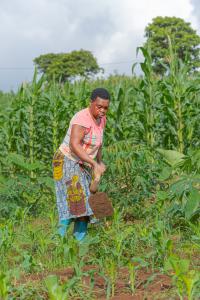Gender equality is key to tackling hunger and malnutrition crises, says Heifer International
International non-profit says barriers to women farmers’ full participation in agrifood systems is holding back food security in world’s hunger hotspots
Without putting women at the center of food systems transformation, the world will fall short on its food security and climate goals.”
CAPE TOWN, SOUTH AFRICA, October 6, 2025 /EINPresswire.com/ -- The world cannot overcome today’s hunger and malnutrition crises without putting women at the center of agrifood systems transformation, Heifer International has said.— Surita Sandosham, President and CEO of Heifer International
The call comes ahead of the UN-declared International Year of the Woman Farmer, and as experts gather this week for the CGIAR Gender in Food, Land and Water Systems Conference 2025, where researchers, policymakers and development leaders are examining how gender equality can drive more sustainable, resilient and equitable food systems.
Analysis indicates that the gender gap in agriculture deprives the world of additional food supplies that could lift 45 million people out of food insecurity. Closing both the gender gap and the wage gap in jobs across the agrifood sector would be enough to increase global gross domestic product (GDP) by one per cent and reduce global food insecurity by about two percentage points.
Heifer is taking the opportunity of the CGIAR gathering to highlight the urgent need for multilateral bodies and local women’s groups to work together, ensuring women farmers have the resources, market access and decision-making power to sustainably transform global food systems.
“Women farmers are at the heart of many rural economies, yet their voices remain too often absent from the decisions that shape food systems,” said Surita Sandosham, President and Chief Executive Officer of Heifer International. “Without putting women at the center of food systems transformation, the world will fall short on its food security and climate goals.”
Heifer’s call comes as momentum builds toward the 2026 International Year of the Woman Farmer, intended to spotlight women's contributions to agriculture and rural economies. Heifer is working with international partners and local community organizations to ensure that this milestone drives lasting change and spotlights the achievements of those at ground-zero of food systems transformation.
Across Southern Africa, Heifer has long invested in gender-focused programs that demonstrate women’s leadership in action. In Zambia, its recently concluded Women’s Economic Empowerment initiative has supported thousands of women smallholders to organize in cooperatives, access finance and adopt climate-smart livestock and crop practices. In South Africa, Heifer and partners have helped rural women build sustainable livelihoods through its signature Passing on the Gift model, which pairs animal assets with intensive training and peer-to-peer support.
And in Tanzania, some 88,0000 smallholder dairy farmers are benefitting from the Tanzania Inclusive Processor-Producer Partnerships in Dairy (TI3P) project, which empowers women through technical and business training.
Fatuma Seif Juma, a dairy farmer from Pemba Island, Tanzania, acquired two dairy cows through a loan and training, which has helped to triple her household income and keep her children in school. “I feel proud that I can support my family now. My children can stay in school, and I no longer feel powerless,” she said.
These initiatives are designed to combat the systemic barriers that women face, such as limited access to land, high-quality and adapted inputs, training, technology, finance and markets. These constraints contribute to a 24 per cent productivity gap between female- and male-managed farms in low-income countries.
Heifer International’s gender-centered approach spans 19 countries across Africa, Asia and the Americas, reaching more than 52 million people since 1944. By combining technical training, market facilitation and advocacy for women’s land and resource rights, Heifer supports women farmers to increase productivity, regenerate land and strengthen food security for entire communities.
“As global leaders in Cape Town discuss the next phase of food systems transformation, they have not just an opportunity, but a responsibility to ensure women farmers are a leading part of it,” said Surita Sandosham. “A failure to dismantle the barriers to participation for women farmers will mean a continuation of this fight with one hand tied behind our backs — a fight that we cannot afford to lose.”
Donna Bowater
Marchmont Communications
donna@marchmontcomms.com
Legal Disclaimer:
EIN Presswire provides this news content "as is" without warranty of any kind. We do not accept any responsibility or liability for the accuracy, content, images, videos, licenses, completeness, legality, or reliability of the information contained in this article. If you have any complaints or copyright issues related to this article, kindly contact the author above.

